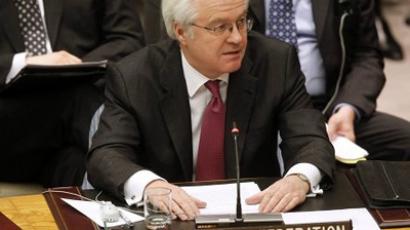Syria hotbed of major geopolitical game
Syria has become caught in the center of a giant geopolitical game that involves the Western powers, Israel, Iran, Lebanon and other global powers. Pushing for the ouster of Bashar Assad, the US is trying to remodel the entire region, observers say.
The West could have used the resolution on Syria as a legal cover for it actions in the Middle East, John Laughland from the Paris-based Institute for Democracy and Co-operation told RT.“The interest of Syria for the Western powers is great proximity to Israel,” the author and journalist claims, underlining the importance of the geopolitical factor in this case rather than energy interests. “It [Syria] has been a party in the war against Israel, it’s one of the big opponents of Israeli state,” he explains. “There is an arch Lebanon-Syria-Iran of geopolitical opposition to Israel and to America’s role in the Middle East.”The regimes that the US and other Western powers are hoping will come to power as a result of the Arab Spring are obviously friendly ones. They want the Middle East to be remodeled along the lines which make the region safe for Israel, Laughland claims.According to the journalist, Moscow vetoed the resolution on Syria because it “has been very annoyed with NATO, with Britain, France and America for the way they exploited the Libyan resolution on Libya, the one which Russia abstained on and therefore allowed to pass.”“Russia suffered a defeat over Libya because [it] opposed the policy of regime change but ultimately had to recognize the new regime in Libya,” he argues, explaining that now Moscow feels that “Russia was taken for a ride over Libya and won’t be taken for a ride over Syria.”On Wednesday, the Russian Foreign Ministry announced that two Syrian opposition delegations will come for talks to Moscow in October."The veto cast by Russia and China on the UN resolution on Syria reflects the gravity of the situation," Dr. Chandra Muzaffar, the President of the International Movement for a Just World., told RT. "Both Russia and China know that a resolution by the Security Council opens door for military intervention by NATO," he says.“It would be another attempt to oust an Arab government and replace it with a government which is sympathetic to the larger geopolitical aims of Washington, London, Paris, and other Western countries.” "Washington is pressing Syrian regime because Bashar Assad’s ouster would allow it change the geopolitics of the entire region," states Dr. Muzaffar."First of all, the US views Bashar Assad as a “leader of a resistance state, resisting Israeli agenda in the region,” he explains.Secondly, Washington wants Assad’s ouster because of his very close ties with Hezbollah, labeled as a terrorist organization by the US.Thirdly, as the Syrian government has very close ties with Tehran, the removal of Assad would impact Iran, leaving it without a key ally.Meanwhile, the Russian fact-finding team sent to Syria has discovered that Bashar Assad has been trying to implement some of the reforms," Dr. Muzaffar notes. “But in the situation where there is an armed insurrection against the state it’s difficult to carry out only reforms.”Dr. Muzaffar underlines that the protest against Bashar Assad comes from two or three cities and not from the two principle cities, Damascus and Aleppo. The majority of population in fact supports Bashar Assad, he concludes.














